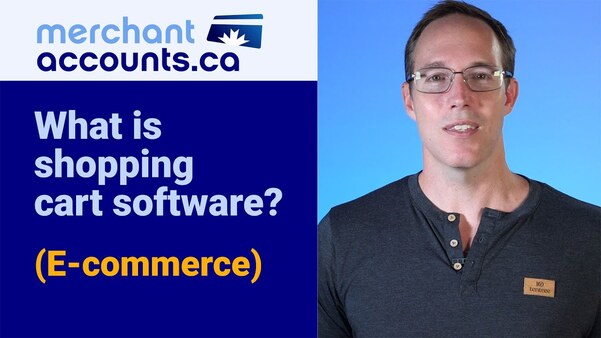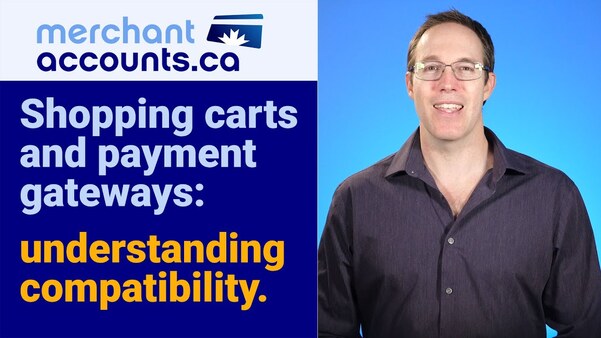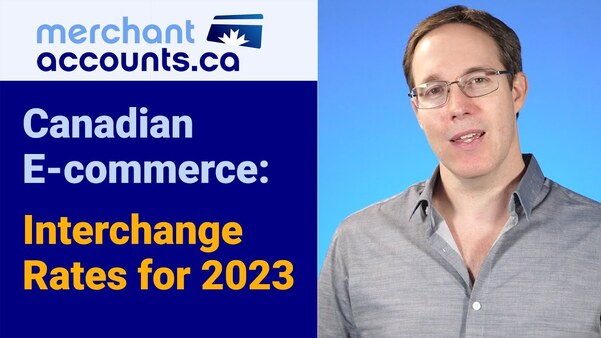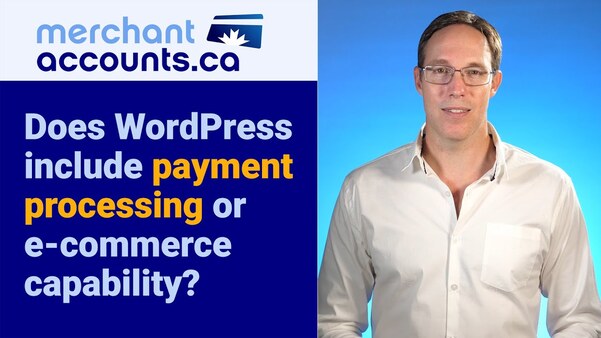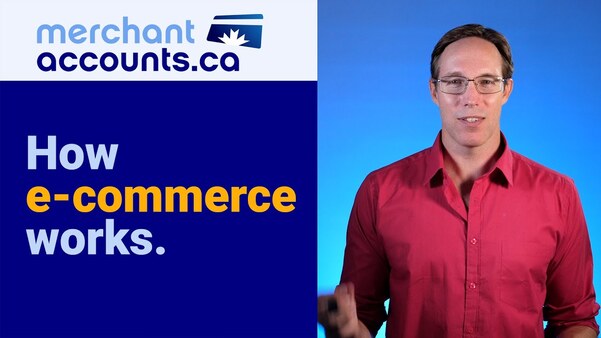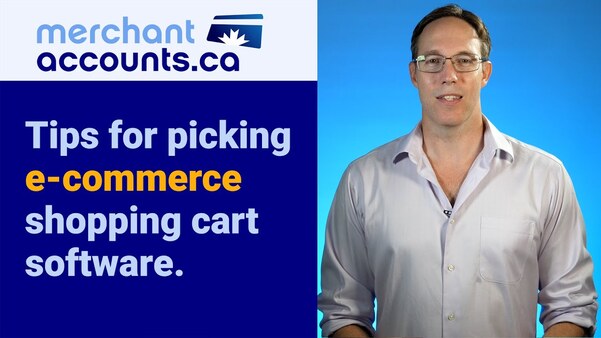January 06, 2023
by David Goodale
Credit Card Processing for Small Business
(Slightly edited from video transcript for greater readability)
Key Takeaways
Hello, David here at Merchant-Accounts.ca. Today I'm going to tackle the topic of what small businesses should keep in mind when they're establishing credit card processing. Stay tuned, we'll dig in, in one second.
Establishing credit card processing
Today I'm going to try to make small business owners aware of the most important things when establishing credit card processing. Then you can dig into other videos on our channel or the merchant accounts.ca website.
Don't get stuck in a long-term contract

The first thing I tell a small business to be aware of is not to get stuck in a long-term contract. Some payment processors have contract terms of one year or two years, or even three years. There's nothing wrong with that if you're using it as a tool to leverage lower rates, which is something that large and established merchants do. If you're a small business, and especially if it's a startup, you don't want to get stuck into a long contract term. Especially if you haven't worked with this payment processor before.
One of the very first things that you should find out is if there's a fixed contract term. Now, if there is a fixed contract term, also make sure that there's no significant penalty. Maybe there's a payment processor that's offered you a great rate, and so you're willing to do something like a one-year contract term, which, I do caution against. I think that's a mistake for a small business. If you do enter that contract term, find out what the cancellation fees are. Don't get into any contracts with big cancellation fees, generally, just don't get into any locked-in contracts.
Approval and Collateral
The next thing we're going to talk about is approval and collateral. Everyone always wants to start talking about rates. Rates are super important. We'll get to rates, but they don't matter if you can't get approved or if the payment processor's holding on to a ton of your money.
Write up a cover letter
What you want to do is when you apply for your merchant account, step one is to write up a cover letter, especially if it's a small business or a new type of business. Let them know who you are, and how you have the expertise to run, this company, and put your best foot forward. Let them know why, although you appear to be a small business, why you're not a risk, and why you're going to be able to continue doing business in the future and you'll be a good client. It might sound silly like, why do I have to do this? Actually, why would you not want to tell your story and paint your business in the best light possible? It's going to pay off big time when it comes to approval, especially if the product or service that you offer is a little bit higher risk.
For example, if it's a small business, but you do subscriptions, for example, you might want to explain to the payment processor that yes, we take subscriptions, but they are monthly subscriptions. We don't sell annual subscriptions. I don't want to get too much into the concept of future delivery risk, which we have other content about, but basically, tell your story and tell it in a positive light.
Is the payment processor a good fit for your business?
Another thing that you can do along this same idea is when you're talking to your payment processor, ask if they support other businesses like yours. Do you have expertise in my industry? Do you work with other small businesses in my industry? That way you'll get to feel if they might be a good fit for you because it's not just about them approving you. You want to approve them. Are they going to be a really good partner for you as your business grows?

Payment processing rates
Now, let's talk about that. I think that rates need to be a very important part of the conversation. I'll start by asking you what's more important, A low rate, like 3% versus 2% per transaction as the discount rate. Is that more important or is the monthly fee more important a $5 monthly fee versus a $100 monthly fee? Well, there's a really important bit of analysis there. Amazon or Netflix does a hundred million dollars a month in volume and doesn't care about paying a hundred-dollar monthly fee. If they could change their processing from 3% cost down to 2%, they'd save a ton of money. For a small business, it's often the monthly fee that matters more because even if you save 1% on your processing if you're only processing $5,000 a month in sales, it's not, that big of a deal.
First, decide what's most important for you and then start to contact payment processors and ask: "Hey, do you have a pricing structure where we could propose asking what we're looking for?" You don't get what you don't ask for? I'm a big advocate for that.
Pricing models
Another thing to consider in terms of the discount rate is that there are a couple of pricing models in the industry, but they are two good ones, the first is flat pricing. Flat pricing is where you get a fixed rate. Again, let's just pretend 3%. If it's a rewards card, if it's an air miles card, if it's a corporate card, it doesn't matter. It doesn't cause your rate to fluctuate. Now, flat rates are great, they're transparent, and they're very easy to reconcile, but they're not the lowest pricing model. If you want to get the lowest rate possible, you ask for something called interchange plus pricing.
Again, I'm trying to make this a condensed video. I don't want to get into a long lesson, but interchange means cost from Visa and MasterCard directly to the payment processor. There's a pricing model where it's called interchange plus, whereas the processor, we say: "Hey, every time you run a transaction, I'm just going to take whatever the cost is from Visa, MasterCard, and add on our fee". Let's pretend I quoted a merchant a rate of 0.5%. The merchant will pay a rate of interchange plus 0.5%. Anytime you process a card, we take the true interchange cost and add on our fee of 0.5% and that's the rate that you pay. Interchange plus pricing is a far better value for larger merchants. If you process more than $10,000 a month roughly, that's when it starts to make sense to look at interchange plus pricing.
Try to get a contract that improves over time
Now, another big thing, this is another trick, and this applies not just to rates, but this applies to everything. The terms of approval that you get as a small business should be able to improve over time. One of the obvious ones is to get automatic rate reductions so you can negotiate anything. One of the things you should be able to negotiate is: "I'm doing $12,000 a month, but once I'm doing $25,000 a month, can you give me a better rate?" You don't have to go back and shop around for a new partner every year or two. It's really good to come up with a long-term strategy. If you find a good payment processor, they should be willing to do this. Like if I have a merchant that's processing $500,000 per month in sales, we can charge them a lot less than someone doing $5,000 a month in sales because that little percentage that we make on every transaction, well, there's so much more volume running through that we can lower our margin. A good processor will be very transparent about this.
You should consider my last point on this, what is the likelihood of strong growth of your business? The stronger the growth, the more important it is to ask for a commitment to a pricing reduction in the future. A lot of payment processors will recoil at that and kind of walk away from it. We'll look at that when the time comes, but you should be able to get that, in writing in an agreement. There's no reason that you can't accomplish that.
E-Commerce
One of the last things to consider as a start, is our smaller startup business, are you doing e-commerce? If so, what shopping cart software are you using? This matters because the services need to be compatible. You make, you need to make sure that your website can talk to the payment processor that you're choosing to work with.
Shopping cart compatibility

This is called compatibility. When people talk about shopping cart compatibility with the payment gateway, the shopping cart is the software that runs on your website. The payment gateway is the thing provided by the payment processor that listens and waits for a transaction. When I have a new client, especially a new small business doing e-commerce for the first time, I always start by asking what are you selling? Do you have shopping cart software that you've selected that you're going to be running on your website? If they already know the software that they're running, then I need to ask, what payment gateways are your shopping cart software compatible with? That way we make sure that when you go through this whole process, you build the whole thing, and it works, which would be nice.
You don't want to go through this process and have a problem at the end. Compatibility is a really important thing. I know that that can be a little bit complicated for small businesses that might not have a lot of technical expertise. If you have a good processor, they'll be able to walk you through this process. If you have any questions, reach out to us at Merchant-Accounts.ca. We're happy to walk you through the components, tell you if they're going to work together, and generally answer any e-commerce-type questions that you have.
Support
Finally, support. How likely are you to need a high level of support? Are you a master at e-commerce? Maybe this is a new small business, but you have other small businesses. Maybe you don't need a ton of support, but a lot of businesses do need support.
If you're the type of person that doesn't mind working through a call center, then you know there are lots of good options out there. Even PayPal, Stripe, and other large aggregators. If you're the type of person that likes to have a dedicated account rep, then you should ask and maybe even ask to make that a part of your processing contract that you want a dedicated account rep available to answer any questions. Because there are very few things in life that are more frustrating than bouncing off a call center. Especially if you're going to have your shopping cart software running on your website, then you'll have your payment processor. You don't want to get stuck between parties. Having good accountable support might be something that you value.
Summary
To summarize pay attention to contract terms, approval, cover letter, rates, pricing model, compatibility, and support. Prioritize do I prefer a low rate, or do I prefer a low monthly fee? Asking for your preferences to be built into the contract. Automatic rate reductions if your volume is likely to grow. Make sure they are no integration concerns so you'll have a good functioning e-commerce solution. I hope you found this helpful. If you do have any questions about setting up credit card processing for your small business, please reach out to us at Merchant-Accounts.ca. Thanks for watching and have a nice day.
Need professional guidance?
Contact us for a free one hour consultation.
Can I Help Lower Your Processing Fees?
If you found this content helpful, will you give me the opportunity to quote on your business?
View Rates


